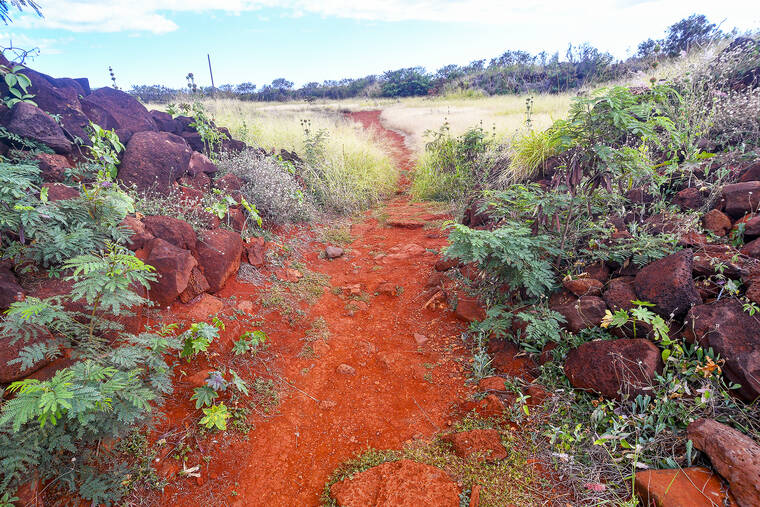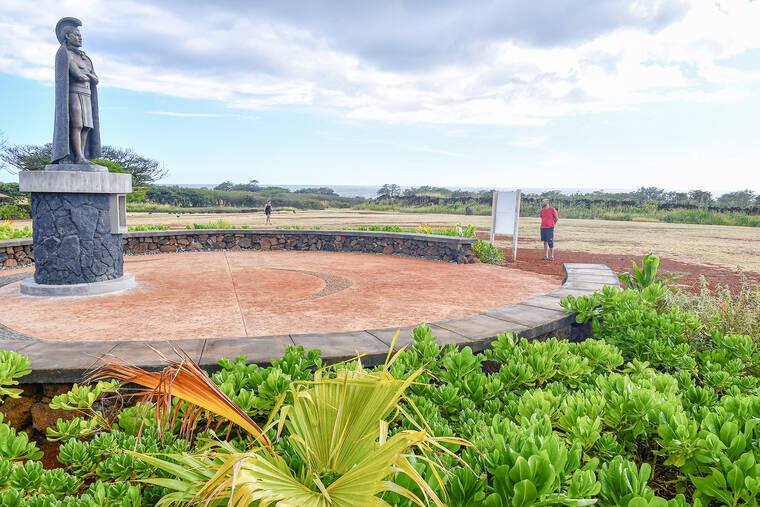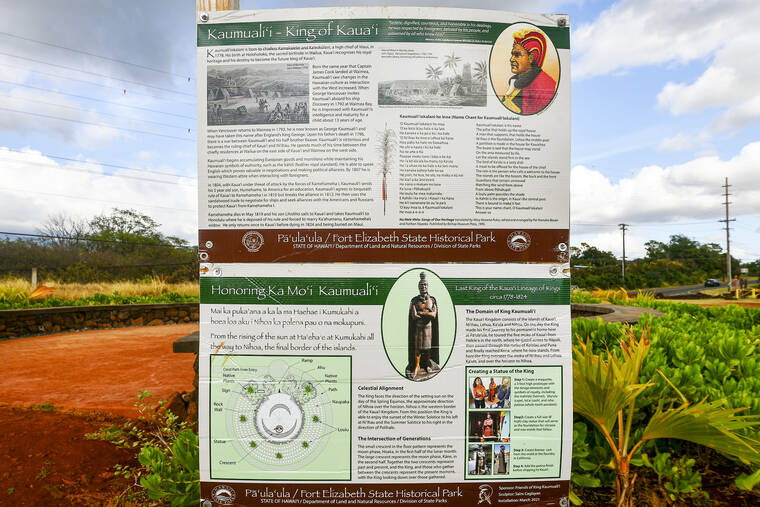LIHU‘E — A state House committee moved forward a resolution to formally rename Waimea’s Russian Fort Elisabeth State Historical Park to Pa‘ula‘ula.
The resolution simply urges the state Department of Land and Natural Resources to make the name change and develop new marketing material for the site. DLNR is also urged to work with the National Park Service to update the National Historic Landmark designation for the site to incorporate the Hawaiian name.
The hearing, held Tuesday morning before the Committee on Water and Land, featured supportive testimony from DLNR, Moku o Manokalanipo, the Kaua‘i Council of the Association of Hawaiian Civic Clubs and Friends of King Kaumuali‘i.
“We agree that Pu‘ula‘ula is a more-accurate name and is the appropriate name,” DLNR Division of State Parks Administrator Curt Cottrell said Tuesday.
Cottrell added that the Hawai‘i Department of Transportation has also removed signs that call the park “Russian Fort.”
“So things are in motion to put it back in a more-accurate host culture, nomenclature and perspective,” Cottrell said.
This resolution would act to initiate the process for a formal name change, which would require the approval of the state Board of Land and Natural Resources, which Chair Suzanne Case is supportive of.
The DLNR Division of State Parks created a 16-person working group back in 2018 to discuss the planning for the park. Represented in the group included Native Hawaiians, researchers, Russian-Americans and the Waimea community.
“From the beginning, the discussion focused on the need to more-accurately reflect the multi-cultural history and recognize the importance of this site in Waimea as a royal center and residential compound of Kaua‘i ali‘i spanning the period before and after Western contact,” Case said in testimony.
Pa‘ula‘ula is the traditional Hawaiian name for the eastern bank of the Waimea River, the location of King Kaumuali‘i’s royal compound, the resolution outlines.
In 1815, the Russian-American Company trade ship Bering shipwrecked on Waimea Bay, fronting the compound. Though the Russian-American Company sent Georg Anton Schaffer to recover the cargo, he instead entered into a secret treaty with Kaumuali‘i, constructing forts.
The name Fort Elisabeth is for a consort of Russian Emperor Alexander I.
Peter Mills, a professor of anthropology at the University of Hawai‘i at Hilo, has studied several Russian-American Company sites in the U.S., and has done research on the site through the University of California at Berkeley.
“What became apparent in researching this site is that it was always a Hawaiian fort (and, more importantly, a royal residence), and only indirectly associated with Russian enterprises,” Mills said in testimony.
The Russian-American Company rejected the secret treaty, and by 1817 Schaffer was run off the island. This led the company to return all Schaffer’s possessions back to Kaumuali‘i, while recalling him back to Russia. Upon Schaffer’s return, he was stripped of his authority and sent back to Germany.
Kaumuali‘i and his descendants occupied the fort for more than 40 years, until it was abandoned in 1864.
In 1885, after the fort’s deconstruction, a Hawaiian government surveyor rendered the map “Plan of Old Russian Fort Waimea, Kaua‘i.” The site was acquired by the state, and has since been designated a National Historic Landmark and listed on the Hawai‘i Register of Historic Places.
The committee passed the resolution, as is, unanimously, Tuesday, with the vote of state House Rep. Daynette “Dee” Morikawa, who represents Kaua‘i’s Westside.
House Resolution 100, with concurrent HCR104, was introduced by Morikawa and fellow Kaua‘i lawmakers, Reps. Nadine Nakamura and Jimmy Tokioka, on March 11.
“The renaming of this wahi pana has been an agenda item that many of us are very passionate about,” said Malia Nobrega Olivera, representing the Moku o Manokalanipo, the Kaua‘i Council of the Association of Hawaiian Civic Clubs.
In November 2018, the group adopted a similar resolution, urging the state to change the name, which has been supported by many who advocate for the history of the area to be at the forefront of decision-making.
“Why must Pa‘ula‘ula be correctly named? Why must the accurate history of the Schaffer affair and its folly be told? Why must the word know that Hawaiian men and women built this stone fort and that both the Russian-American Company and Tsar Alexander disavow Schaffer’s actions?” Mauna Kea Trask wrote in written testimony. “Because it’s the truth, and the truth is one of the most-effective weapons against tyranny.”
The resolution did receive one letter in opposition, from the Center for Hawaiian Sovereignty Studies, based in Kane‘ohe.
“The Russian-ness of Russian Fort is an essential part of Kaua’i’s history,” Executive Director Kenneth Conklin writes. “The current attempt to rename Russian Fort by giving it an obscure Hawaiian-language name is typical of the ethnic cleansing and homogenization of Hawaiian history which Hawaiian race-partisans have been doing for several decades.”
In more-recent history, earlier this month, the U.S. Department of Justice announced charges against Elena Branson, a dual citizen of Russia and the U.S., for acting as an illegal Russian agent, advancing the interest of the Russian government and receiving funding from high-level Russian officials while being tasked with advancing the foreign government.
In part, the charging documents pointed to Branson lobbying Kaua‘i County Councilmember Felicia Cowden for the retention of the fort’s name.
Cowden, in written testimony submitted Monday, voiced her individual support for the name change.
“As a participating member of the Waimea park working group, I observed that consensus was generally reached across all stakeholder groups roughly three years ago to accept a name change that better reflects the Hawaiian heritage of the park, now beautifully graced with the statue area of King Kaumuali‘i,” Cowden wrote in testimony. “The change is long overdue.”
Too, with the recent invasion of Ukraine by Russia, there has seemed to be more urgency in the renaming.
However, many advocates for Pa‘ula‘ula have been around for decades.
“While I am reluctant to support any historical name change based on the modern politics of the Ukraine invasion, I have been advocating for this name change for almost 30 years, and it is past time that Hawai‘i’s own cultural heritage be recognized,” Mills said.
•••
Sabrina Bodon, editor, can be reached at 245-0441 or sbodon@thegardenisland.com.





Plus having a Russian named landmark is kind of embarrassing at the moment.
After all the stuff that’s happened in Ukraine
I had a bet with myself that this was going to happen
looks like I won.